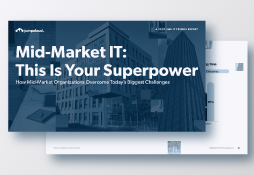In modern IT environments — where teams are distributed, stacks are diversified, and SaaS reigns supreme — visibility is everything. Yet, one of the biggest threats to operational efficiency and security in mid-market organizations today is something that thrives in the dark.
It’s the infamous shadow IT. It neither announces itself nor does it come with a service ticket. But it spreads. And if left unchecked, it compromises everything from compliance to budget planning, and most importantly your security posture.
The more strategic your organization becomes, the more dangerous unmanaged technology becomes — and the more critical it is to bring shadow IT into the light.
The good news for mid-market IT teams? You’re not powerless against it and you don’t need mighty resources to fight back. All you need is complete visibility, consistent agility, and a solution built to help you act fast and stay in control.
By the end of this blog, you’ll know how to identify, manage, and turn shadow IT into a strategic win for your organization. Let’s jump in!
Shadow IT: What It Is & Why It’s All Over Your Network
Shadow IT refers to any technology, tool, or software used inside an organization without the knowledge or approval of the IT department. That could be a team member signing up for a free project management tool or a department head buying a SaaS license without looping in IT. Even syncing files to a personal cloud storage application can be considered shadow IT.
These tools usually sneak in through good intentions: users want to be productive (fair enough). In fact, our latest SME IT Trends Special Report saw that 61% of mid-market orgs like yours discovered shadow resources on their networks in the past year.
But when IT teams don’t know what’s being used, they can neither secure it nor effectively manage it. That’s where risks emerge.
The Hidden Risks of Shadow IT
Unmanaged tools bring a host of serious risks — some obvious, some quietly destructive:
- Security vulnerabilities: Without IT oversight, there’s no way to guarantee that shadow apps are secure. These tools often lack strong authentication, encryption, or patching, creating wide-open entry points for threat actors.
- Compliance exposure: Regulated industries or geographies come with strict data handling rules. Shadow IT makes it almost impossible to ensure your org stays compliant, because you don’t know where sensitive data lives or who has access to it.
- Operational inefficiency: Multiple tools doing the same job? Fragmented data? Poor integration? Shadow IT is a breeding ground for inefficiency. It increases IT workloads and muddies your tech stack.
- Financial waste: When teams adopt tools independently, it leads to redundant licenses, hidden spend, and budget drain. SaaS sprawl becomes a line item that eats into your margins.
Despite these risks, shadow IT continues to thrive. If you’re still reading this blog, it’s a reminder that you’ve got to be well-equipped to detect and control shadow IT in real time.
Why Shadow IT Hits Mid-Market Organizations Harder
Over 70% of mid-market IT professionals report being concerned about shadow IT — and for good reason.
Mid-market organizations live in a unique space: big enough to need sophisticated tech, but often not resourced like enterprises. You’re growing fast and need to support a wide range of business units — often with lean teams.
Agility is your strength, but it can also be your vulnerability. When things move fast, policies don’t always keep up. And with decentralized decision-making, unsanctioned tools can quietly slip into your environment.
That’s why mid-market orgs sit in the “danger zone” — complex enough to attract serious risk, but not always structured to manage it at scale.
Bringing Shadow IT into the Light
The first step in tackling shadow IT is to gain full visibility into what’s happening across your environment: devices, apps, users, and everything in between. For most IT teams, achieving that level of insight is a real challenge.
Manual discovery processes are time-consuming and rarely comprehensive. Relying on department heads to report the tools their teams are using often results in outdated or incomplete information. And managing a collection of disconnected point solutions only adds to the noise!
To be proactive, you need a centralized, real-time view of the entire SaaS ecosystem. That’s where a modern SaaS management solution makes all the difference.
How SaaS Management Saves the Day
Many (37%) mid-market orgs plan to invest in SaaS management in the next six months. It’s a clear signal that visibility and control have become strategic priorities.
A modern SaaS management solution provides a unified view of all apps in use across your organization — whether or not they are officially approved by IT. It empowers IT teams to assess usage patterns, surface risk, and take decisive, informed action.
Your SaaS management solution should enable you to:
- Automatically discover all apps connected to your environment
- Identify unauthorized tools and rogue usage
- Consolidate and optimize your SaaS spend
- Enforce security policies at the identity and device level
- Improve user experiences through better tool provisioning and access control
These unified capabilities give IT the clarity and control needed to lead with confidence.
What to Look for in a SaaS Management Solution
To truly address the complexity of modern environments, your SaaS management solution should deliver more than surface-level visibility. Here are the essentials to look for:
- Real-time app inventory across users, devices, and environments
- Integration with your identity provider for granular access control
- Contextual insights like user activity, license usage, and data flow
- Security alerts for high-risk or unsanctioned apps
- Automated workflows for onboarding and offboarding
Above all, the platform should be easy to deploy, intuitive to use, and scalable as your organization grows.
Tackle Shadow IT (and What Comes Next) with JumpCloud
Shadow IT won’t go away on its own. The longer it stays hidden, the more it erodes your security posture and drains your resources. By adopting the right SaaS management solution, you not only minimize risk but also build a more intentional, secure, and agile IT environment.
JumpCloud’s SaaS management solution gives you that freedom. It helps you uncover what’s hiding in your stack, enforce policies with precision, and streamline access — all from a single platform, without adding complexity.
Want to see how top mid-market teams are getting ahead of shadow IT and other pressing device management challenges? Download JumpCloud’s Mid-Market IT: This Is Your Superpower eBook to get the full picture.








